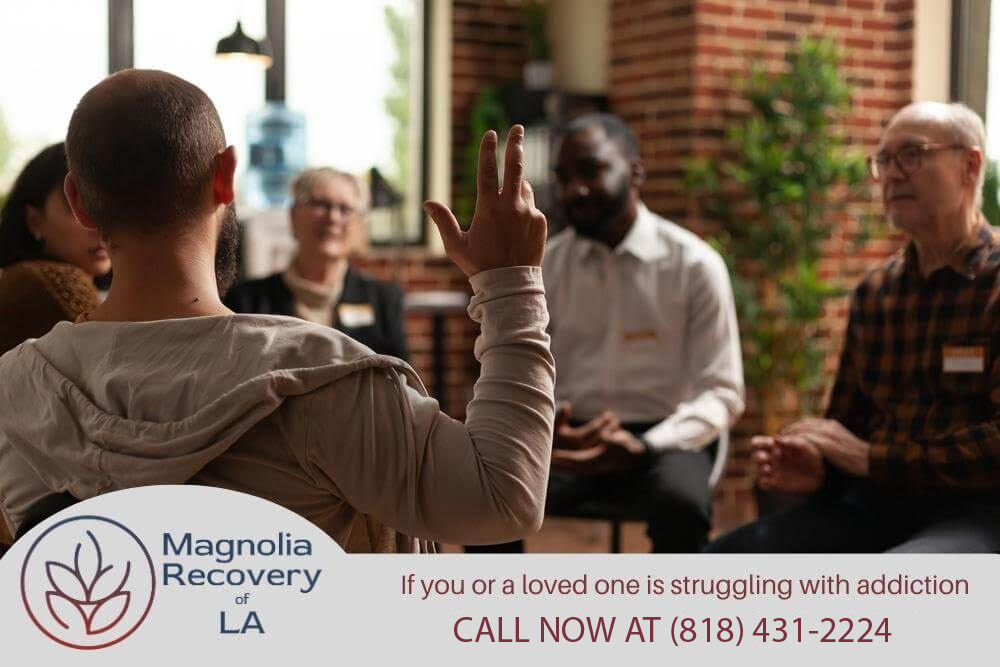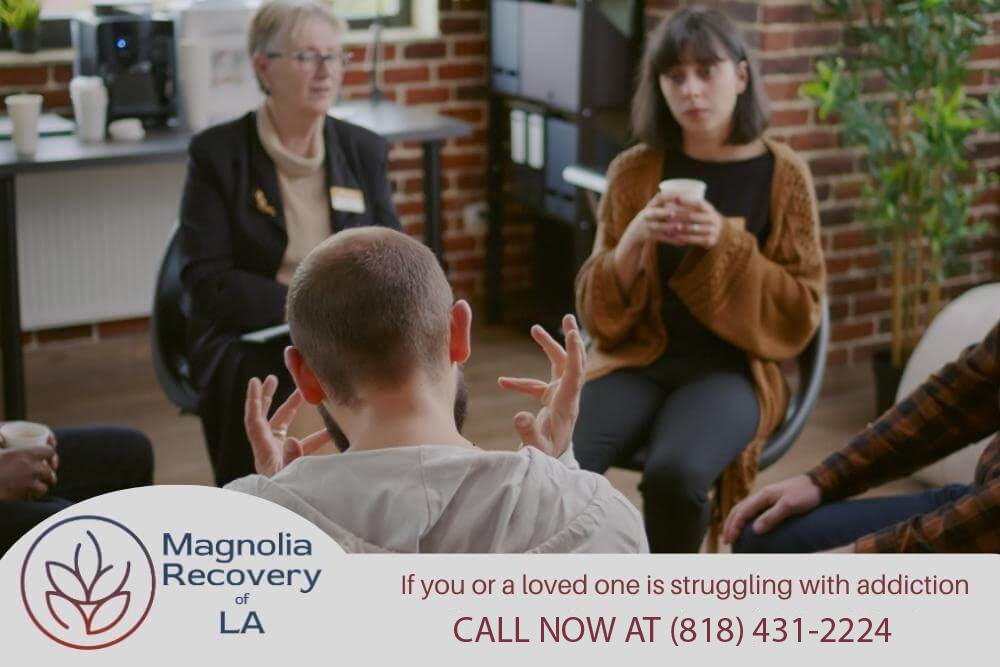Top Rated Outpatient Drug Rehab Center
With good reason, Magnolia Recovery is one of California’s top-rated outpatient drug rehab centers. Our expert team of therapists and doctors care deeply about your success in recovery and will do everything in their power to give you the tools you need to thrive. Millions of Americans live daily with a physical dependency on drugs and alcohol, and many never receive treatment. That doesn’t need to be your story; Magnolia Recovery is here to help. Keep reading to learn more about our programs and how outpatient rehab is the catalyst you need to make positive change.
Drug Rehab That Allows You to Still Go to Work & School
If you’re worried that you can’t afford to take time off from work, school, or family obligations but realize that you need help to stop using drugs and alcohol, there is hope. Effective treatment options that allow you to keep your commitments exist, and they’re here at Magnolia. Recognizing that you need help to make different decisions is the first step toward change. It’s also courageous to open up to others about what you have been dealing with in your life. Too often, our society demonizes those who struggle with drug or alcohol use. The stigma enveloping drug and alcohol addiction paints a picture for us of poor choices or some moral character flaw. This could not be further from the truth. Addiction, also called substance use disorder, is a medical disease no different from cancer, diabetes, or asthma. Every significant medical association, from the American Medical Association to the World Health Organization, agrees that addiction is a treatable illness.
We understand the science behind addiction and use proven, evidence-based therapies to treat this disease. We also know that shame and punishment are ineffective ways to heal illness. Persecuting people for asthma seems ridiculous, but that’s what society does to those with a substance use disorder. Our facility is a safe space where people can heal from their illnesses without judgment or condemnation.
Benefits of Outpatient Drug Rehab
Treatment facilities offer several types of rehab programs based on national models set forth by the Substance Abuse and Mental Health Services Administration (SAMHSA). Each program has unique benefits. Outpatient treatment, meaning therapy where you leave at the end of the day, offers maximum flexibility for those with obligations they can’t put aside to attend inpatient treatment. Outpatient rehab may benefit you by:
- Allows you to continue working. You’ll be able to keep working based on the type of outpatient rehab program you choose. Therapy sessions can be scheduled to take place before or after work hours, so you won’t have to take vacation days or explain to your boss why you need time off. We all need to eat and pay our bills, which can make the idea of missing work extremely stressful.
- Lowers costs. Because you either go home or to a sober living facility after hours, outpatient rehab programs cost less than inpatient ones. This will be even more important to those without healthcare insurance.
- Allows you to continue to attend school. Stopping your college or university program to attend rehab could rob you of your momentum for education and make you feel isolated and ashamed. An outpatient rehab program will let you keep studying and attend classes.
- Family first. Many people have no one to take over childcare duties to attend rehab. This is considered an influencing factor for women seeking treatment less than men.
What To Expect During Outpatient Rehab
You’ll begin the intake process by contacting our admissions specialists, available 24/7 to answer questions. You’ll sit with your team for an interview when you arrive at our facility. You’ll begin therapy immediately if you don’t need a supervised medical detox. Expect to participate in the following types of individual therapy.
- Cognitive Behavioral Therapy. CBT aims to reduce symptoms of various mental health conditions, primarily depression and anxiety disorders.
- Dialectical Behavioral Therapy. The main goals are to teach people how to live in the moment, develop healthy ways to cope with stress, regulate their emotions, and improve their relationships with others.
- Emotional self-regulated therapy. A manualized treatment that integrates components of cognitive-behavioral, acceptance, dialectical, mindfulness-based, and experiential, emotion-focused therapies.
- Interpersonal Psychotherapy. Brief, attachment-focused psychotherapy that centers on resolving interpersonal problems and symptomatic recovery.
- Relapse Prevention. A skills-based, cognitive-behavioral approach requires you and your clinicians to identify situations that place the person at greater risk for relapse.
- Cognitive Restructuring. The therapeutic process of identifying and challenging negative and irrational thoughts. These sorts of thoughts are called cognitive distortions.
- Distress Tolerance Therapy. A type of intervention in Dialectical Behavioral Therapy (DBT) where you learn to manage distress healthily.
- Anger management. A psycho-therapeutic program for anger prevention and control. It has been described as deploying anger successfully. Anger is frequently a result of frustration or feeling blocked or thwarted.
You’ll also participate in group therapy sessions like the following:
- Art Therapy
- Emotional self-regulation. A group that focuses on learning and practicing managing disruptive emotions and impulses.
- Mindfulness. A group focusing on developing and practicing mindfulness skills to provide you with the tools to learn how to balance emotions and cope with life stresses without reverting to the use of substances.
- Denial management. A group focusing on learning how to identify the thoughts, feelings, urges actions, and social reactions associated with denial patterns and how these patterns might affect your ability to sustain sobriety.
- Life & Social Skills. Focused on discussing and teaching the necessary skills to reintegrate into daily life tasks, such as cooking food for yourself, cleaning your personal space, balancing a personal budget, exercising regularly, and eating a healthy diet.
- Seeking Safety. A weekly group focused on the Seeking Safety model, which is an evidence-based treatment for PTSD, substance abuse, and other problem behaviors that stem from emotional dysregulation.
- Healing through Creativity. A creative expression group focused on exploring how you experience life, pain, and healing by integrating art and creativity.
- Psycho-education. The group focused on receiving education about their disorders and different coping methods. This group utilizes the group therapy process, where members share their concerns and struggles with recovery with the group and facilitator.
- Health and Wellness. A weekly group focused on increasing your knowledge of the different aspects of health, including emotional, physical, and psychological.
- Nutrition Education
- Distress Tolerance Skills. A group focusing on learning the necessary skills to tolerate and survive crises and accept life as it is in the moment, therefore reducing impulsive/self-destructive decisions.
- Emotional Self Regulation
- Health Awareness. A weekly group facilitated by a medical provider in which the client receives information related to HIV, Hep C, Covid-19, Medication Compliance, and other topics.
- Interpersonal Relationships. A group focused on assisting you in bringing significant changes in your close interpersonal relationships and developing new strategies to deal with others.
- Daily goals. A daily solution group focused on assisting you in identifying alternatives to negative patterns or behaviors. This group focuses on building solutions; while current issues are not ignored, you are encouraged to focus energy on your desired future.
We are pleased to offer holistic, complimentary treatments alongside our evidence-based treatment programs, like yoga, meditation, and massage.
How Long Does Outpatient Rehab Last With Magnolia Recovery?
The short answer to this question is as long as you need. However, some factors can impact your length of treatment, like the type of substance used and the length of use, your age, and your family history. Rehab programs are typically split into 30, 60, and 90-day installments. Your care team will work with you to determine your needed time. Everyone is different and responds to treatment on individual timelines, meaning the length of stay will differ. It’s important to note that community support will be critical in relapse prevention after rehab. Groups like Alcoholics Anonymous, Narcotics Anonymous, and the Secular Organization for Sobriety are essential when life throws a curve ball. Recovery from addiction is a life-long process, one that needs frequent checkups, not unlike cancer. Aftercare groups like AA are proven to reduce the risk of relapse; your case manager will help you find an aftercare support program that suits your needs when your treatment has finished.
IOP (Intensive Outpatient Program)
Our IOP averages at least 9 hours a week, consisting of various therapies for substance use disorder and co-occurring disorders. Over 40% of people with addiction have co-occurring mental health issues like PTSD, major depressive disorder, anxiety, or schizophrenia. IOP therapies can be scheduled around your obligations, before or after work, or during breaks in your school day.
PHP (Partial Hospitalization Program)
A PHP will see you traveling to our facility from home during the day, should you have a safe home environment. If not, we’ll arrange a residence in the sober living home for you. You can expect to put at least 20 hours a week into therapy when attending a PHP, both individual and group sessions.
Which Outpatient Treatment, IOP or PHP Is Right for Me?
Studies also show that the more therapy you receive, the better your chance of avoiding a relapse. It’s good to note, though, that relapse is a part of recovery and is not something to be ashamed of if it happens to you. You’ll need to weigh your well-being against the needs of your commitments. You could start on the PHP, but may need less time as treatment progresses; in that case, you could switch to an IOP. Devote as much time to treatment as you can spare to give yourself the space to heal. When you arrive at our facility, your care team will work with you to determine what program suits your needs. Everyone is different; therefore, every recovery program will be different.
Why Choose Magnolia Recovery
Located in sunny California, we pride ourselves on being among the best treatment facilities in Los Angeles. With a high staff-to-patient ratio, you’ll benefit from more personalized therapy sessions. Our small residential facility is beautifully furnished, with bright, open spaces. We offer amenities such as a private chef experienced in recovery nutrition, housekeeping, a smart TV, and outdoor lounge areas by the pool. We accept most major insurance; you can verify yours online with this simple form. We welcome couples. When you’re in treatment at Magnolia Recovery, you can expect to participate in guided extra-curricular activities that showcase our beautiful state and city weekly, like hiking, museum trips, beach excursions, and more.
Let the experience and dedication of our staff guide you into a different way of living, a way of life you may have never thought possible.
The time for change is now; call us at (818) 431-2224 to begin your path to recovery.


